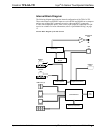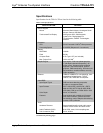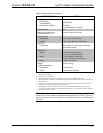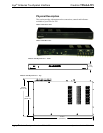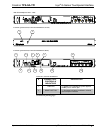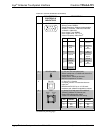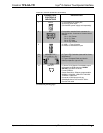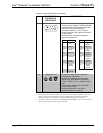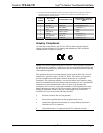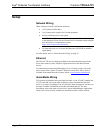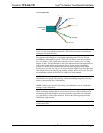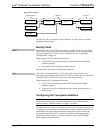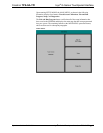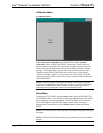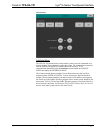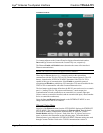
Crestron TPS-GA-TPI Isys
®
G-Series Touchpanel Interface
Operations Guide – DOC. 6501 Isys
®
G-Series Touchpanel Interface: TPS-GA-TPI • 11
4. The eight-pin RJ-45 QuickMedia transport port accepts CAT5E/CAT6 carrying audio, video and
microphone signals. The QM output port conforms to the 568B wiring standard. Refer to the
following table for connector pinouts.
RJ-45 PIN
NUMBER
WIRE COLORS
(EIA 568B)
QM ASSIGNMENT: RGB
QM ASSIGNMENT: COMPOSITE,
S-VIDEO, COMPONENT AND
AUDIO
1 WHITE/ORANGE
- RGB RED
- CHROMINANCE (- P
r
)
2 ORANGE
+ RGB RED
+ CHROMINANCE (+ P
r
)
3 WHITE/GREEN
- RGB GREEN
- LUMINANCE (- Y)
4 BLUE
+ DIGITAL AUDIO
+ AUDIO
5 WHITE/BLUE
- DIGITAL AUDIO
- AUDIO
6 GREEN
+ RGB GREEN
+ LUMINANCE (+ Y)
7 WHITE/BROWN
- RGB BLUE
- COMPOSITE (- P
b
)
8 BROWN
+ RGB BLUE
+ COMPOSITE (+ P
b
)
Industry Compliance
As of the date of manufacture, the TPS-GA-TPI, has been tested and found to
comply with specifications for CE marking and standards per EMC and Radio
communications Compliance Labeling.
NOTE: This device complies with part 15 of the FCC rules. Operation is subject to
the following two conditions: (1) this device may not cause harmful interference and
(2) this device must accept any interference received, including interference that may
cause undesired operation.
This equipment has been tested and found to comply with the limits for a Class B
digital device, pursuant to part 15 of the FCC Rules. These limits are designed to
provide reasonable protection against harmful interference in a residential
installation. This equipment generates, uses and can radiate radio frequency energy
and if not installed and used in accordance with the instructions, may cause harmful
interference to radio communications. However, there is no guarantee that
interference will not occur in a particular installation. If this equipment does cause
harmful interference to radio or television reception, which can be determined by
turning the equipment off and on, the user is encouraged to try to correct the
interference by one or more of the following measures:
Reorient or relocate the receiving antenna.
Increase the separation between the equipment and receiver.
Connect the equipment into an outlet on a circuit different from that to
which the receiver is connected.
Consult the dealer or an experienced radio/TV technician for help.



